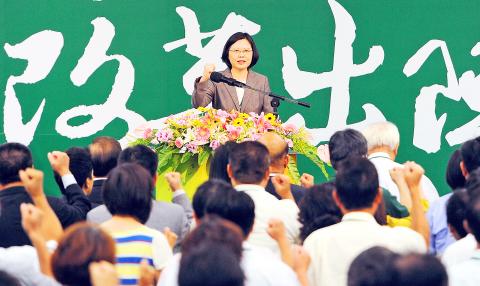Democratic Progressive Party (DPP) Chairperson Tsai Ing-wen (蔡英文) yesterday sent all the proposals in the national party congress regarding the DPP’s China policy, including the widely discussed freezing of its Taiwan independence clause, to the party’s Central Executive Committee without discussion, defusing potential tension surrounding the issue despite drawing criticism from party members.
Citing time constraints, Tsai, who presided over the meeting, proposed to send the initiatives to the committee because there was “not enough time left for a thorough discussion over the much-disputed and important issue regarding changing the party charter.”
Only about 20 minutes were left in the scheduled 60-minute meeting before the party representatives were set to take hours voting for the new members of the committee and the Central Standing Committee, the DPP’s decisionmaking bodies.

Photo: Liao Chen-huei, Taipei Times
Several members briefly protested Tsai’s move and voiced their displeasure, despite the majority of the hundreds of representatives applauding to show their agreement with Tsai’s decision.
“If the Central Executive Committee decides that a wide range of discussion and opinion-gathering is necessary, we don’t rule out organizing an extraordinary party congress,” Tsai added.
Among the dozen items on the meeting’s agenda, the proposals related to the Taiwan independence clause in the party charter and its China policy were the focal point of the congress, as the dispute over the proposal has been going on for months and members with different ideologies challenged each other with their initiatives.
The contentious items included a proposal to freeze the independence clause — which calls for the establishment of a republic of Taiwan — to boost the party’s chance of returning to power; a proposal that called for the next presidential candidate to submit an “independence timetable” and a proposed “resolution on development across the Taiwan Strait” to help the nation join international organizations.
DPP Legislator Chen Ting-fei (陳亭妃) also launched a motion — seen as a retaliation to the “freezing independence clause” proposal — that called for the implementation of the DPP’s 2007 resolution on making Taiwan a normal country. The initiative was also sent to the Central Executive Committee.
In response to reporters’ questions after the meeting, Tsai insisted that her decision was appropriate, saying that the DPP charter had been amended eight times since its founding in 1986 and not once had the charter been amended without comprehensive discussions.
Almost all DPP heavyweights saw freezing the clause as unnecessary, with Greater Tainan Mayor William Lai (賴清德) saying before the meeting that “whether or not [freezing the independence charter] would shorten the DPP’s ‘last mile’ of returning to power should be carefully examined.”
Former party chairman Su Tseng-chang (蘇貞昌) and former premier Yu Shyi-kun opposed the proposal. Yu said it would be “impossible” for the proposal to be passed because Taiwanese independence was one of the DPP’s core values.
The national congress was the first gathering of party representatives across the nation since Tsai assumed the party’s helm in May.
In her opening remarks, Tsai said Taiwanese “have had enough” of President Ma Ying-jeou’s (馬英九) administration, as he has wasted the past six years on political infighting and the pursuit of his presidential legacy by bringing Taiwan closer to China without regard for the consequences.

SECURITY: As China is ‘reshaping’ Hong Kong’s population, Taiwan must raise the eligibility threshold for applications from Hong Kongers, Chiu Chui-cheng said When Hong Kong and Macau citizens apply for residency in Taiwan, it would be under a new category that includes a “national security observation period,” Mainland Affairs Council (MAC) Minister Chiu Chui-cheng (邱垂正) said yesterday. President William Lai (賴清德) on March 13 announced 17 strategies to counter China’s aggression toward Taiwan, including incorporating national security considerations into the review process for residency applications from Hong Kong and Macau citizens. The situation in Hong Kong is constantly changing, Chiu said to media yesterday on the sidelines of the Taipei Technology Run hosted by the Taipei Neihu Technology Park Development Association. With

CARROT AND STICK: While unrelenting in its military threats, China attracted nearly 40,000 Taiwanese to over 400 business events last year Nearly 40,000 Taiwanese last year joined industry events in China, such as conferences and trade fairs, supported by the Chinese government, a study showed yesterday, as Beijing ramps up a charm offensive toward Taipei alongside military pressure. China has long taken a carrot-and-stick approach to Taiwan, threatening it with the prospect of military action while reaching out to those it believes are amenable to Beijing’s point of view. Taiwanese security officials are wary of what they see as Beijing’s influence campaigns to sway public opinion after Taipei and Beijing gradually resumed travel links halted by the COVID-19 pandemic, but the scale of

A US Marine Corps regiment equipped with Naval Strike Missiles (NSM) is set to participate in the upcoming Balikatan 25 exercise in the Luzon Strait, marking the system’s first-ever deployment in the Philippines. US and Philippine officials have separately confirmed that the Navy Marine Expeditionary Ship Interdiction System (NMESIS) — the mobile launch platform for the Naval Strike Missile — would take part in the joint exercise. The missiles are being deployed to “a strategic first island chain chokepoint” in the waters between Taiwan proper and the Philippines, US-based Naval News reported. “The Luzon Strait and Bashi Channel represent a critical access

Pope Francis is be laid to rest on Saturday after lying in state for three days in St Peter’s Basilica, where the faithful are expected to flock to pay their respects to history’s first Latin American pontiff. The cardinals met yesterday in the Vatican’s synod hall to chart the next steps before a conclave begins to choose Francis’ successor, as condolences poured in from around the world. According to current norms, the conclave must begin between May 5 and 10. The cardinals set the funeral for Saturday at 10am in St Peter’s Square, to be celebrated by the dean of the College